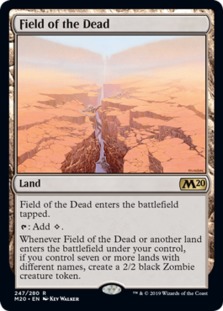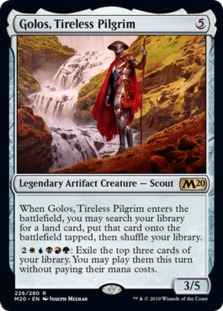Against the Odds: Maze's End (Pioneer, Magic Online)
Hello, everyone. Welcome to episode 213 of Against the Odds. Last week, we had an alternate win condition poll for the Pioneer format. While it was a close battle between Hedron Alignment and Maze's End, when it was all said and done [,[Maze's End]] came out on top by just a single percent of the vote! As such, we're heading to Pioneer today to see how practical it is to get ten Gates on the battlefield along with a Maze's End to win the game! On one hand, thanks to the Pioneer card pool, we don't have to worry about cheap land destruction like Fulminator Mage or Stone Rain, or jank-'em-out cards like Blood Moon, which makes it seem like Pioneer might be the type of format where Maze's End can truly shine. On the other hand, we're also missing some Modern-legal tricks to speed up Maze's End, like Primeval Titan and Amulet of Vigor. What are the odds of winning with Maze's End in Pioneer? Let's get to the video and find out; then, we'll talk more about the deck!
A quick reminder: if you haven't already, make sure to subscribe to the MTGGoldfish YouTube channel.
Against the Odds: Maze's End (Pioneer)

The Deck
Maze's End is actually a pretty straightforward deck to build. The goal is simple: live long enough to get 10 Gates on the battlefield and activate Maze's End to win the game. While there might be a way to do it with Scapeshift and Splendid Reclamation, Pioneer has some really powerful ramp cards, so our deck is mostly focused on searching for Gates and Maze's End out of our deck, ramping to 10 as quickly as possible, and finishing the game. Since we have to play a ton of Gates to make Maze's End work, we also get some surprisingly powerful Gate payoffs in Guild Summit for card draw and Gates Ablaze, as a cheap sweeper against creature decks.

Maze's End is a really unique way to win the game that happens to line up well with the Pioneer format since some of the cards that make it difficult in Modern (Ghost Quarter, Blood Moon, Fulminator Mage, etc.) aren't legal in the format. While Maze's End's main purpose is to activate and then win the game once we have nine or 10 Gates on the battlefield (if we are at nine, Maze's End can tutor up the last one to get the win), it also gives us a weird, slow way to fix our mana by tutoring our Gates early in the game with its Thawing Glaciers–like ability.



Of course, Maze's End comes with a downside: we need to fill our mana base with enters-the-battlefield-tapped Gates (although we can hopefully turn this to our benefit with some additional Gate payoffs). As a result, the hardest part of building a good Maze's End deck is including enough Gates to make Maze's End and our other Gate payoffs work, while still fitting in as many untapped lands as possible so that we can occasionally cast our spells on-curve. In our deck, we have one (or more) copy of each Guildgate along with a single Gateway Plaza, giving us 11 total Gates, which is actually pretty important. If we had just 10 Gates, a single Unmoored Ego or Assassin's Trophy could ruin our day, but with 11 Gates in our deck, our opponent needs multiple hate cards to fizzle our Maze's End win.



We also managed to sneak eight untapped lands into our deck, between shock lands, basic lands, and a single copy of Plaza of Harmony, along with one Field of the Dead. Before you groan about Field of the Dead, hear me out: with just a single copy, it's very unlikely we'll ever win the game with Zombie tokens. Instead, Field of the Dead is just a way to make some chump blockers to help us stay alive while we are finding 10 Gates and Maze's End. It also works really well with Maze's End since we can activate Maze's End to find a Gate and make a Zombie, and then replay Maze's End as our land for the turn to make a second Zombie, giving us a steady stream of chump blockers while also slowly upping our Gate count for the eventual Maze's End win.

While Maze's End itself can slowly get 10 Gates on the battlefield, we have a bunch of ramp cards to help speed up the process. Golos, Tireless Pilgrim is the best of the bunch since it can snag any land we need, so if we don't have a Maze's End, Golos, Tireless Pilgrim can find one, and if we already have a Maze's End, Golos can grab whatever Gate we happen to be missing. In the late game, we can also use Golos's second ability as card advantage, although it does come with some risk: some of our Gates are just one-ofs, and if we happen to exile two or three of them in the same activation, we can be stuck without enough different Gates to win the game. Mathematically, this shouldn't happen often, but if we do decide to activate Golos, it is very, very important that we do so before making a land drop, so that we can play a one-of Gate if we happen to exile it.


I've been pretty hard on Arboreal Grazer over the years, but Maze's End is the perfect deck to take advantage of the one-drop. Not only do we have 29 lands, so the odds of having an extra in hand when we play Arboreal Grazer are high, but being able to put a land into play from our hand works especially well with Maze's End since it allows us to make a land drop for the turn, activate Maze's End to tutor out a Gate, and then use Arboreal Grazer to put the Maze's End back into play to activate again the next turn. Growth Spiral is basically another Arboreal Grazer, allowing us to do the same trick with Maze's End, but instead of leaving behind a 0/3 chump-blocking body, it allows us to draw an extra card to dig for more Gates, removal, and Gate payoffs.

Circuitous Route is the perfect ramp spell for a Maze's End deck, tutoring two Gates that we don't yet have on the battlefield directly from our library to the battlefield. This allows us to snag one-of Gates that we are less likely to naturally draw. Plus, in the late game, we often have enough mana that we can cast a Circuitous Route to grab our eighth and ninth different Gates and immediately activate Maze's End to win the game.



Since we have so many Gates in our deck to win with Maze's End, we can almost accidentally take advantage of some powerful Gate payoffs. Guild Summit is our main source of card advantage, usually drawing us a new hand when it comes into play and then giving us an extra card each turn we play Gates. Meanwhile, Gates Ablaze joins Supreme Verdict in the sweeper slot. Initially, I only had Gates Ablaze, but some decks in Pioneer (like Heroic and Hardened Scales) can grow their creatures quicker than we can get Gates on the battlefield, making Gates Ablaze worse than you'd think against some creature decks. This lead to the three-two split of Gates Ablaze and Supreme Verdict. Gates Ablaze is cheaper and better against a lot of aggro decks, while Supreme Verdict is annoyingly hard to cast sometimes thanks to its double-white cost, but it cleans up anything that happens to slip by our Gates Ablaze.



Rounding out the deck is some interaction. Abrade deals with creatures in the early game as well as hate cards like Pithing Needle that can turn off the Maze's End kill by making it so we can't activate Maze's End itself. Assassin's Trophy hits anything, making it a good way to break up combos like Jeskai Ascendancy or Copy Cat. Meanwhile, The Immortal Sun is just a one-of, but in a deck like ours that can ramp so quickly, it offers a good way to disrupt planeswalker decks as a sort of mass Pithing Needle. One of the challenges of beating decks like Copy Cat Combo is that if you Pithing Needle Saheeli Rai, they can often use Teferi, Time Raveler or Oko, Thief of Crowns to deal with the Pithing Needle and proceed to combo off. The Immortal Sun turns off not only the combo but also most of our opponent's ways to answer our answer. Plus, in the worst case, it draws us an extra card each turn, which is never a bad thing.
The Matchups
One of the upsides of Maze's End is that it's good against both aggro and control. Against aggressive creature decks, we have five wraths and some good chump blockers to stabilize. Meanwhile, control decks have a really hard time beating Maze's End itself since it dodges all of their interaction (counterspells, removal). On the other hand, as we saw against Jeskai Ascendancy, combo can be tough for Maze's End since our deck is fairly slow. While our wraths are great at slowing down the game against creature decks, they don't do much against spell-based combos.
The Odds
All in all, we played five matches with Maze's End and ended up winning four, giving us an 80% match win percentage and making Maze's End significantly above average for an Against the Odds deck. More impressively, we beat a lot of the top decks in the format, including Hardened Scales, Copy Cat, Mono-Black Devotion, and Green Devotion! Surprisingly, Maze's End felt like a fairly competitive Pioneer deck. Thanks to the lack of cheap hate cards for lands, the plan of ramping into 10 gates and winning with Maze's End is very safe in the format. While four copies of Maze's End itself might be a bit excessive since we can tutor it out with Golos, I wouldn't be surprised to find that Maze's End was a real deck in the format!
Vote for Next Week's Deck
As we wait for things to shake out in other formats, next week we're heading again to my new favorite format - Pioneer - to build around a janky enchantment. Which of these odd-ball enchantments should we play next week? Let us know by voting below!





Conclusion
Anyway, that's all for today. Don't forget to vote for next week's deck! As always, leave your thoughts, ideas, opinions, and suggestions in the comments, and you can reach me on Twitter @SaffronOlive or at SaffronOlive@MTGGoldfish.com.













